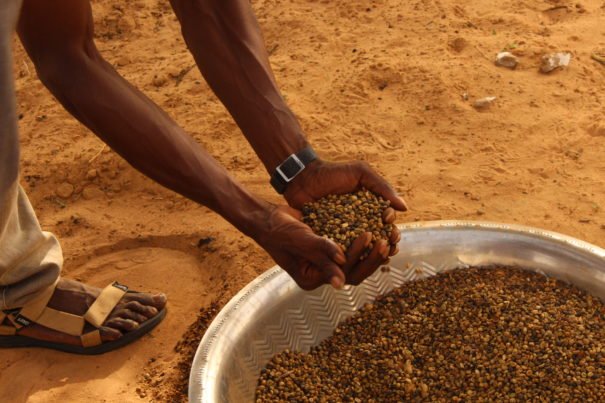
How to Resist Colonialism and Instant Coffee

How to Resist Colonialism and Instant Coffee
Café Touba in Senegal
“Baye Fall kheweul!” The calls soar across the sands, summoning us to breakfast. As I greet everyone gathered on the breakfast mat with “Salaam aleykum,” then ask if they slept well, my friend pours me a steaming cup of Café Touba. I bring the mug to my lips; the coffee smells of clove and pepper, dark-roasted and sweet. “Nanga def?” she asks. How are you? “Maangi fi rekk,” I respond–I am here. I take a sip.
Café Touba is Senegal’s signature coffee, a blend of roasted coffee beans with djar, or grains of selim, a pepper common in West African cooking. Traditionally served with at least a few spoonfuls of sugar, the coffee is a sweet, aromatic, distinctly Senegalese drink. Here, in this Baye Fall daara, or Islamic spiritual community, it’s homemade, and served all day long.
Café Touba is associated with the Mouride brotherhood, in particular the Baye Fall sect. The religious leader Cheikh Ahmadou Bamba founded the brotherhood in the early 20th century, preaching hard work and submission to God’s will. Bamba also emphasized peaceful resistance against French colonial rule, encouraging people to follow traditional African and Islamic values, rather than those imposed by the French.
Fearful of his growing popularity, the colonial administration exiled Bamba to Gabon, where he is said to have discovered djar and started to brew his signature spiced coffee. When he returned to Senegal, he served the coffee to his followers in the city of Touba. Today, Café Touba addicts can find their fix almost anywhere in Senegal, usually for a few cents at a breakfast shop, or from a young boy wheeling his portable coffee shop through the streets. In Mbacke Kadior, they produce the coffee themselves, washing, cleaning, roasting, and grinding the beans and the pepper.
Over the course of the day, we cross paths with people preparing the coffee. We watch them wash the raw beans, loosening a few last pesky husks. Later, they sit in the shade of a small tree and hand-pluck small stones and rotten beans from a wide basin of sun-dried beans. We join them, sifting the pale coffee beans through our fingers, searching for small, rust-colored pebbles. It is a labor of love, like many forms of work done in the daara; a kind of spiritual practice or meditation. Maangi fi rekk: I am here only.
Café Touba is a quiet but forceful resistance against imports such as Nestlé’s instant coffee and powdered milk, and a reminder of history, faith, and culture. It’s generously distributed each morning, and, well-caffeinated, the community disperses; some build new huts, some weed peanut fields, others prepare lunch. We are here, they seem to say; and we, too, will resist.